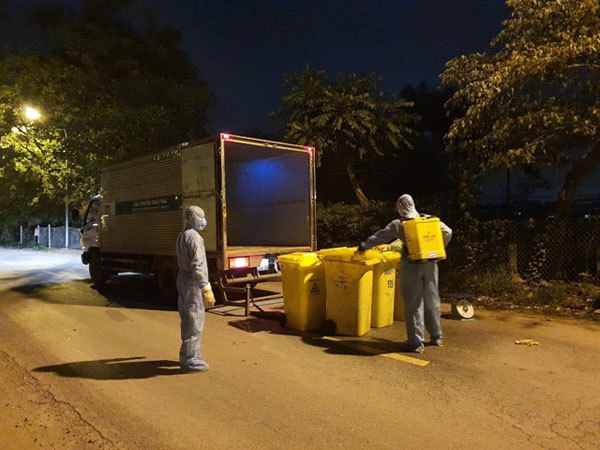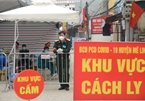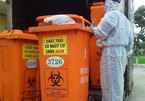from the quarantine area with handcarts.
 |
|
Domestic garbage is collected in Hanoi's Ha Loi Village, the country's newest COVID-19 infection cluster.
|
Pham Anh Tuan, director of the district’s Management Board, said domestic waste from Ha Loi Village was a risk in spreading the disease if it was not treated properly.
He has asked the company to arrange workers to be in charge of collecting garbage from the area.
These workers would collect garbage at every gate of the households in every lane of the village with handcarts.
Collected garbage would be covered with sealed bags and transported to the waste treatment areas at 5pm everyday.
The process of garbage collection would be implemented until the end of isolation in the village.
In addition, the management board has installed three mobile toilets at three checkpoints. The company would be in charge of mobilising workers to maintain sanitation of the toilets.
The company has been asked to sign a contract with the Urban and Industrial Environment No 13 Joint Stock Company (URENCO 13) under the Environment and Urban Company to organise the garbage collection at collection points and transport it to the treatment areas.
The amount of waste discharged from Ha Loi Village was estimated to be about two tonnes per day.
Tong Viet Dung, deputy director of URENCO 13, said the company has mobilised six drivers and three trucks to collect garbage. Each vehicle would make a trip per day at between 4pm and 6pm.
The company has also implemented disinfection spraying with Cloramin B on the trucks to prevent the spread of the disease. — VNS

Hanoi: Family members supply food to lockdown Ha Loi Village
Many people who bring food to their family members in the lockdown Ha Loi Village in Hanoi must be disinfected and checked carefully.

Proper medical waste control helps reduce spread of disease in Vietnam
Vice head of Vietnam Environment Administration Nguyen Thuong Hien spoke about medical waste treatment during the COVID-19 pandemic.
 Local authorities in Hanoi’s Me Linh District has requested Minh Quan Company, the garbage collection unit in the country’s newest COVID-19 infection cluster in Ha Loi Village, to mobilise six permanent workers to collect garbage
Local authorities in Hanoi’s Me Linh District has requested Minh Quan Company, the garbage collection unit in the country’s newest COVID-19 infection cluster in Ha Loi Village, to mobilise six permanent workers to collect garbage